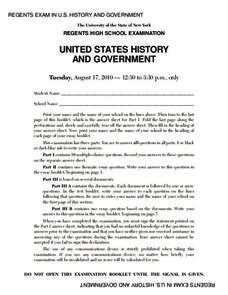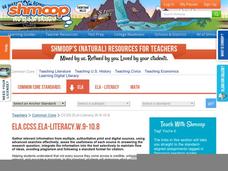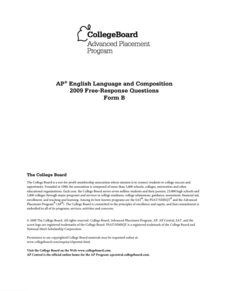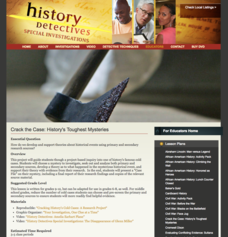EngageNY
Applying Research Skills: “Rachel Carson: Environmentalist and Writer”
It's important to cite sources! Scholars take a closer look at their research about DDT by examining how to cite sources. Learners take turns sharing information that would be used to cite sources to complement Rachel Carson:...
PBS
Using Primary Sources: The Rogue's Gallery
What would be in your life's scrapbook? Scholars use short video clips, primary and secondary documents, and photos to investigate a 1909 scrapbook. They analyze and uncover what the Rogue Book tells them about the past in Western...
Curated OER
Information Problem Solving
Middle schoolers present information about an author of young adult literature using a HyperStudio stack.
EduGAINs
Go H2O! Investigating Residential Water Systems
Before your learners excuse themselves to get a drink at the water fountain, prompt them to think about where that water comes from. A middle school science instructional activity encourages groups to research their community's source of...
Ford's Theatre
How Perspective Shapes Understanding of History
The Boston Massacre may be an iconic event in American history, but perhaps the British soldiers had another point of view. Using primary sources, including reports from Boston newspapers and secondary sources from the British...
National Energy Education Development Project
Great Energy Debate
If someone yelled for eight years and eight months, they could produce enough energy to heat one cup of coffee. A lesson on energy encourages scholars to research 10 different energy sources in groups before playing a game. Twenty...
New York State Education Department
US History and Government Examination: August 2010
Geography has played a complex role in America history. The Atlantic Ocean has served as a buffer to protect the United States from European Wars, but its proximity to Cuba, however, left it vulnerable to nuclear war during the Cuban...
New York State Education Department
Global History and Geography Examination: August 2011
The Mongols, Spanish, and Ottomans all rewrote history with their conquest and control of empires. Yet, each made its mark differently. Using a variety of secondary and primary sources, pupils consider the similarities and differences...
New York State Education Department
Global History and Geography Examination: June 2011
People in Ukraine, Rwanda, and Cambodia have all faced challenges to their human rights and even genocide. Using primary and secondary sources, scholars evaluate these challenges and the international community's role in them. The...
New York State Education Department
US History and Government Examination: August 2013
While the United States is now one of the strongest countries in the world, at its founding, it was plagued by controversies over the ratification of the Constitution, the Louisiana Purchase, and the expansion of slavery. Using a...
New York State Education Department
US History and Government Examination: January 2010
From the trade of the colonial era to the Clean Water Act, water has shaped American history. Class members unpack how water affected the American story using primary sources that span events including the Lewis and Clark expedition to...
Stanford University
Iranian Constitutional Revolution
What makes a good primary source? The assessment tests pupils' knowledge of how to use primary sources with written responses. Designed for high school social studies, it requires scholars to read and analyze a text excerpt concerning...
New York State Education Department
US History and Government Examination: January 2012
What led to the United States Civil War? Interested historians consider a variety of political, social, and economic factors using primary sources and an essay prompt in an authentic high-stakes test. Primary sources include political...
University of California
Impact of the California Missions on Native Americans
While the Spanish claimed to bring civilization to California indigenous peoples, in reality, they also brought violence and forced assimilation to European values. Primary sources, such as the reports of Catholic priests and Europeans...
Curated OER
Where Did Foods Originate? (Foods of the New World and Old World)
What do papayas, peanuts, pineapples, and potatoes have in common? Why, they are foods explorers brought back to the Old World. Young researchers use the Internet to investigate how New World explorers helped change the Old World's diet....
National History Day
“War Is Hell. We Know it Now.” American Soldiers in the Meuse-Argonne Offensive
Understanding the soldier's experiences during World War I sometimes takes a newscast. Learners see the importance of understanding multiple points of view with a newscast project surrounding the Meuse-Argonne Offensive. Compare and...
Historical Thinking Matters
Spanish-American War: 3 Day Lesson
Why did the United States choose to invade Cuba in 1898? As part of a 3-day lesson, your young historians will first develop working hypotheses to answer this question, then work with a variety of historical primary source documents that...
Shmoop
ELA.CCSS.ELA-Literacy.W.9-10.8
Demonstrate the importance of evaluating and citing sources. Pupils can complete the suggested assignment provided here, or one of your choosing, while focusing on checking that the resources are credible and citing those sources...
Curated OER
Worksheet for Analysis of a Letter
Dear Nancy, how do you analyze a letter? Love, Trez. Dear Trez, you use a Letter Analysis Worksheet. Love, Nancy.
This richly detailed worksheet provides multiple questions that lead researchers step-by-step through the process of...
College Board
2009 AP® English Language and Composition Free-Response Questions Form B
In writing, an argument can be considered valid if writers have evidence to support it. Free-response questions from the AP® English Language and Composition exam ask writers to craft three argumentative essays. One prompt asks test...
Curated OER
Fresh Foods from Farm to Table
Are you a good egg? Learners begin a farm-to-table lesson by acting out verbs in groups to demonstrate the egg production process, and then research the steps using online resources. Several excellent videos are linked through the...
Curated OER
Reporting from Multiple Sources-The Role of Dogs in Three Societies
Students synthesize information from various resources. In this expository essay writing lesson, students view three video segments and take notes. Students analyze notes in peer groups and write an expository essay.
Roy Rosenzweig Center for History and New Media
The Boston Massacre: You Be the Judge!
The importance of considering multiple perspectives of the same event is the big idea in this exercise that focuses on the Boston Massacre. Class groups examine photos of four depictions of the massacre, an English and an American...
PBS
Crack the Case: History's Toughest Mysteries
Young sleuths don their trench coats, tip their fedoras, and grab their notepads to investigate one of four famous unsolved mysteries. After examining multiple primary and secondary sources related to their cold case, they propose a...

























